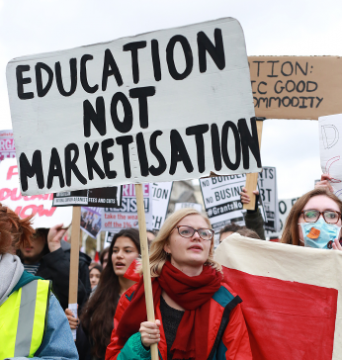As many higher education institutions are on the brink of financial collapse, it’s time to understand what has brought about this perfect storm and what can be done about it.
Headlines often focus on ‘over-reliance on international students’ but it is more complex than that. Why do you think universities try so hard to recruit international students?... because their fees are not regulated, and universities can charge what they think they can get away with given market forces; i.e. Cambridge can charge a student from China more than Cardiff Met can. So, are they just being greedy in recruiting internationally? Not really – what they are trying to do is cover the short-fall that arises when domestic student fees have barely risen in over ten years.
In 2012, universities could charge an undergraduate student £9,000 per year; twelve years later, that figure has only risen to £9,250, while the universities’ costs have gone through the roof. We are all familiar with the current cost of living crisis but imagine how much worse it would be without a pay rise in twelve years!
So the answer is to raise tuition fees?? No, of course not – the answer is to challenge the marketisation of higher education. This, and this alone, is the cause of the problem.
In a stroke of neo-liberal “genius”, the then established £3,000 per year tuition fee was pushed into true capitalist territory in 2012, and universities could charge between £6,000 and £9,000 a year. A typical university was expected to charge £6,000, and only exceptional institutions would charge £9,000. The government believed that market forces would sort it all out; the ‘good’ universities would survive, and the sub-par ones would wither away or merge.
To make matters worse, 2015 saw the strategy of market forces coming into play again, with the lifting of the cap on student numbers. Rather than each university being capped regarding the number of students it could recruit, any university could now recruit as many students as it wanted. This was great news for Russell Group Universities and other more prestigious institutions, but less good for smaller, regional universities and the ex-polytechnics. If you could get into Bristol Uni, why would you go to the University of the West of England (UWE, ex-Bristol Poly)? The picture was the same across the country, with the pre-1992 universities basically hoovering up as many students as they could by lowering their entry standards. The knock-on effect was the post-1992 universities having to lower their own entry standards even further to be in with a chance of attracting enough students and their much needed fee income.
Many universities are now reporting that the percentage of students with mental health concerns is at an all time high. The pressure to get a degree, and the willingness of universities to offer places, means that many students find themselves really struggling with degree-level study, as well as debt.
There is no positive spin on the marketisation of high education; all that has happened is that the rich institutions have got richer and the poor have got poorer, while student choice and mental health have suffered.
Market forces cannot and should not be applied to our education.
While the economy may be in too much of a mess right now to campaign for an immediate abolition of student fees, a realistic step in the right direction would to reinstate the cap on student numbers as a measure that would at least distribute the income from student fees more fairly across the sector. Despite what the Russell Group of universities may say, this idea is not unheard of – in the midst of Covid, it looked like it was going to happen (see this Guardian article [1]).
What we are seeing now is the all too familiar effects of market forces – increasing concentration of wealth in ever fewer hands and a declining standard of service available to all but those with the deepest pockets. Looking no further than the housing sector or the railways, to name but two, should leave little doubt as to where marketisation of education, if allowed to go unchecked, is ultimately headed.
The Solidarity Federation Education Union sees the education system, including the HE sector, as a resource to be made as widely accessible as possible. Market forces, on the other hand, are about re-distributing wealth from society at large into the hands of those at the top. In other words, the type of education available for the majority of us will become increasingly sub-standard, while the richest will always be free to pay for the best.
As a radical grass-roots union, SFEU is not motivated by the self-interested politics of the likes of the Russell Group and other capitalist structures. Instead, 100% of our collective energy is directed at fighting for the interests of those engaged in education, whether as workers, no matter what job, or as consumers.
Join SFEU today and let’s fight for a fairer future.
[1] https://www.theguardian.com/world/2020/mar/29/government-set-to-cap-univ...
Thu, 11/07/2024 - 11:52
SFEU Marketisation of Higher Education statement
Other Posts
| Crisis after crisis (posted 18. July) |
| Higher Education Marketisation - What did they expect!? (posted 6. March) |
| SFEU Marketisation of Higher Education statement (posted 11. July) |
| Humanities under attack in HE (posted 12. March) |
| Marking and Assessment Boycott in Higher Education keeps pressure on employers (posted 25. July) |
